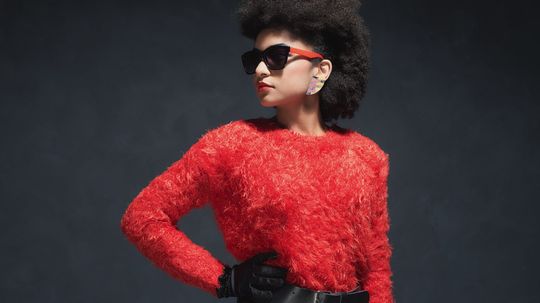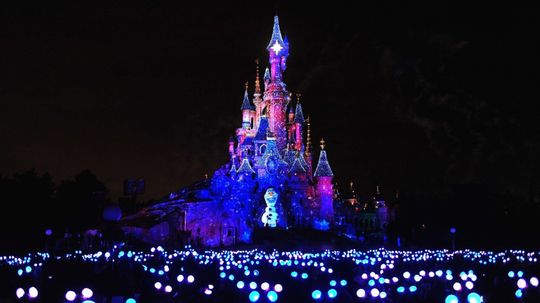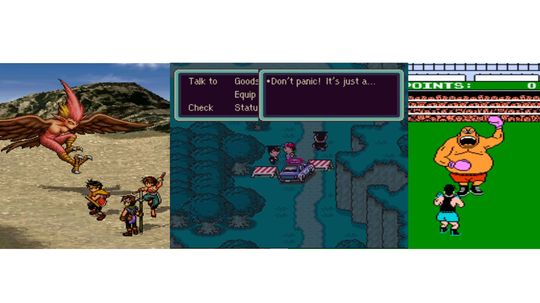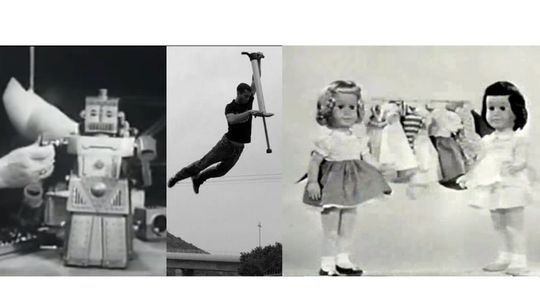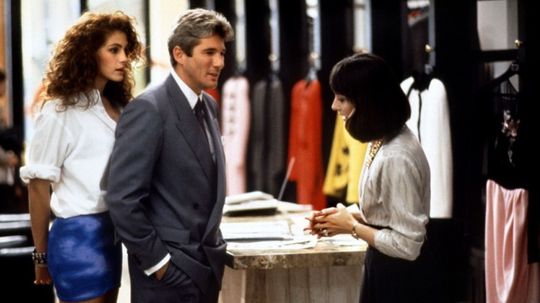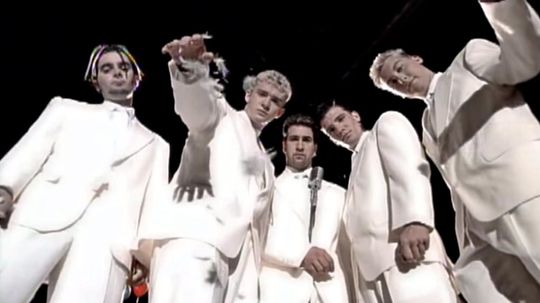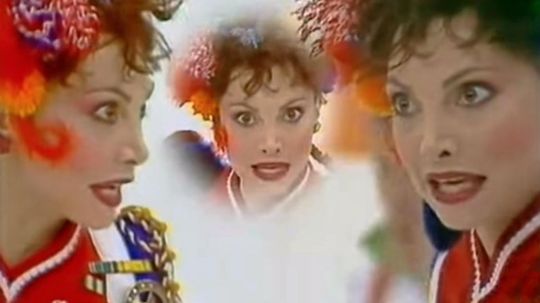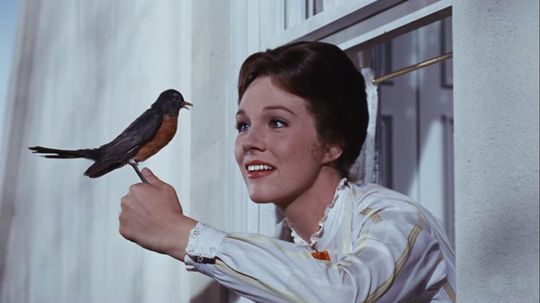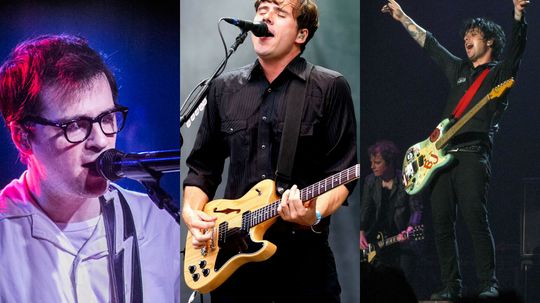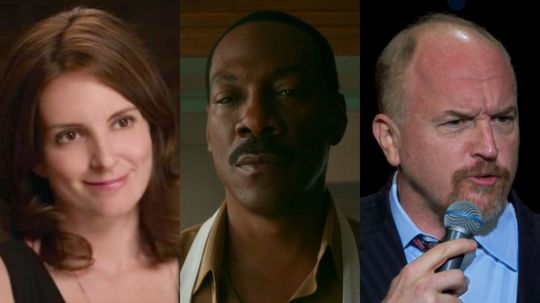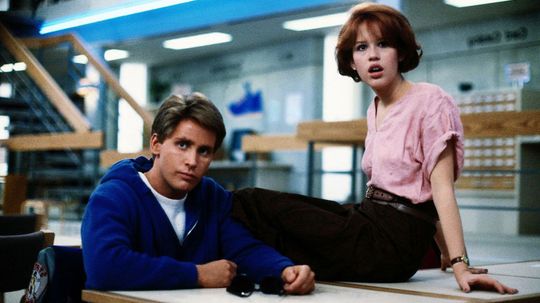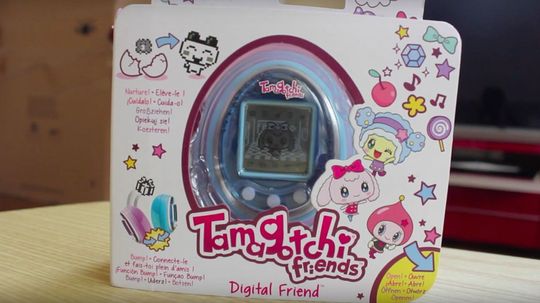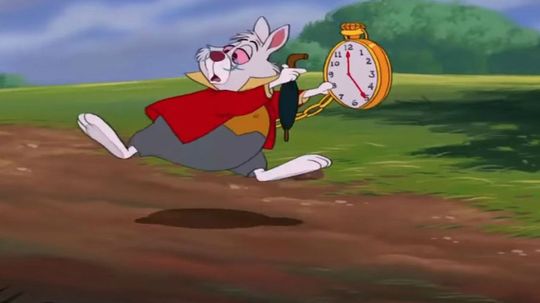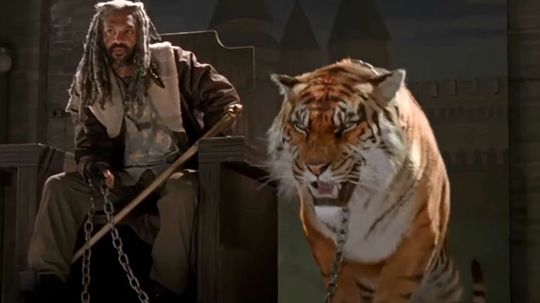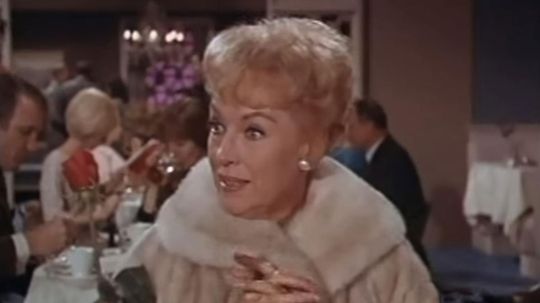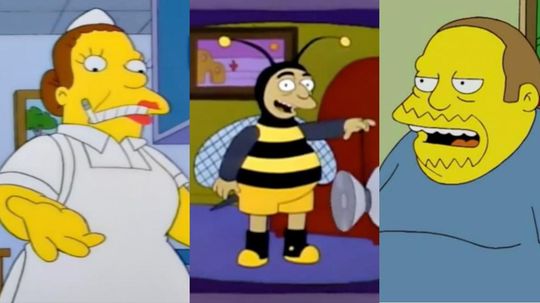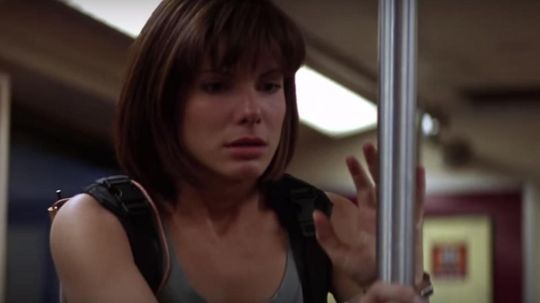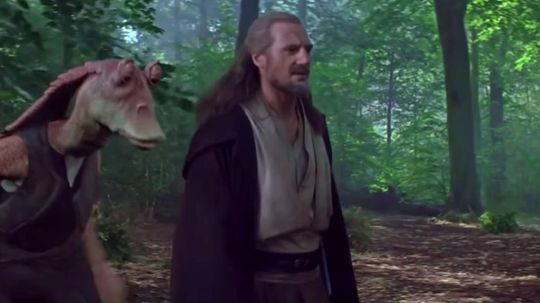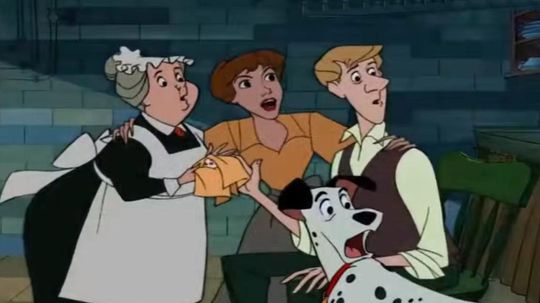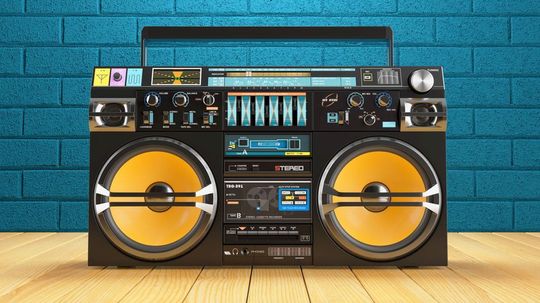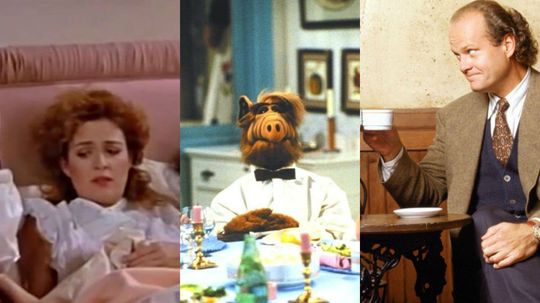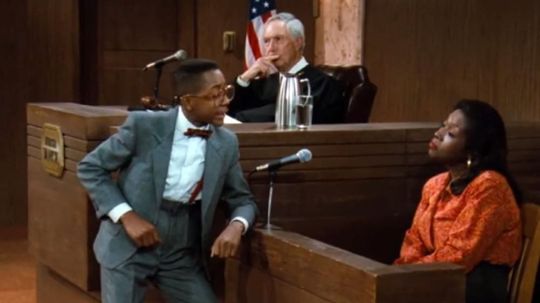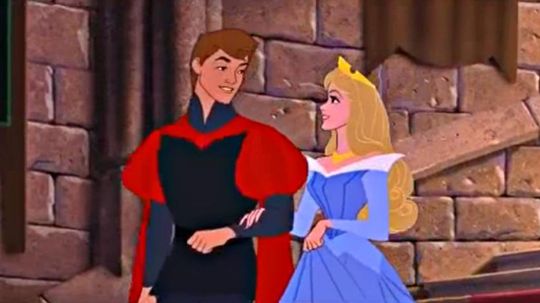TV, Film & Music
Are you a pro at pop culture? Do your friends always turn to you when they can't remember what a song lyric is? Or what the name of Ross Geller's ex-wife was? If so, you'll want to try a few of our entertainment quizzes.
Learn More / Page 26
The 1980's brought us some great fashion items like the windbreaker, legwarmers over leggings, and padded sleeves. Let's see which band name you get based on your fashion choices.
By Khadija Leon
There may not be one person on the planet who hates Disney, so the question remains, how obsessed are you really? Take this quiz to find out where you fall on the obsession meter.
By Kennita Leon
Keeping up with the console classics is no longer as simple as plug-and-play. However, many of us still miss the retro game experience. Foxes flying in space, elves slaying kingdoms ... which classic console games do you remember?
By Valerie
Advertisement
The 1950s and '60s brought us the Hula Hoop, Etch-A-Sketch and many other toy industry icons. If they were on your Christmas wish list as a child or you're a fan of vintage toys, do you think you can identify all the toys in our quiz from a single image? Take a walk down memory lane and find out!
By Jacqueline Samaroo
Oh, to go on a "Pretty Woman" shopping spree! Well, while you can't go on a real one right now, you can go on an imaginary spree. In return, we'll tell you who your celebrity dream guy is.
By Kennita Leon
We love the '90s! When it comes to music of the decade, we're flooded with pop hits, boy bands and the rise of hip hop. Do you think you can guess the opening lyrics to these popular hits? Let's find out!
By Jouviane Alexandre
Admit it, you kind of miss the simpler times of MySpace. Give us a clear sense of what you had on your page and we'll pair you up with a fitting screen name.
By Steven Miller
Advertisement
The '80s were a decade of pop, punk, blues, and synth music, and each genre had its fair share of One Hit Wonders. How well do you remember the lyrics to these memorable songs? Can you match the lyrics to the song?
By Abi Luftig
What's a childhood without a Disney movie in your memory? Whether you followed the live action movies starring the teen versions of today's hot celebs, or went gaga over the animated movies we still watch over and over today, Disney-produced movies are forever etched in our pop culture-loving hearts. Think you can guess their latest or classic flicks if we give you 5 clues? Then take a magic carpet ride and try this quiz!
By Olivia Cantor
At one point or another, we all were in love with an emo band, and some of us may still be today. And we each had that one leader who made our hearts flutter. Who is he today? Who is your emo lover?
By Kennita Leon
Take the stage and give us your best tight five. While your jokes may not tickle everyone's funny bone, let's find out which comic shares your sense of humor the most.
By Steven Miller
Advertisement
Strap on your nostalgia hat and tell us what you kept in your '80s lunchbox. Then, we'll tell you what lovable misfit from "The Breakfast Club" you are most like!
By Teresa M.
Let's put your caregiving skills to the test! Are you ready for a real pet or is a Tamagotchi a little too much of a commitment for you? Let's find out if your Tamagotchi lives or if it goes to electronics heaven!
By Teresa M.
Disney sidekicks are loyal and helpful. They're able to make the main character's journey a little better. Think you can match the sidekick to the Disney movie? Take the quiz to find out!
By Heather Cahill
Season 7 of "The Walking Dead" started off with a bang, or a smash, some would say. Take this quiz and find out how much you remember about one of the most gut-wrenching seasons so far!
By Gavin Thagard
Advertisement
How much do you know about Sergeant Joe Friday, and his partners? Take this quiz to see how much you really remember about one of the most famous and influential dramas ever to be on TV.
By Allie T.
"The Simpsons" is a true pop culture icon. The prime-time animated television show has won more than 30 Emmy awards, earned its creators, owners and cast members billions of dollars, and infiltrated every possible part of popular culture. There are Simpsons theme parks, video games, a feature film and mountains of merchandise. But beyond its material success, "The Simpsons" has become a noteworthy part of American (and worldwide) culture. The catchphrases of Simpsons characters have become part of the English lexicon, and the show has changed how we understand comedy and satire. A good episode of "The Simpsons" can be electrifyingly smart and make you laugh at a loud belch or a character getting hit with a rake. The show's writers might use a subplot to poke fun at organized religion, while also parodying a famous film and developing the personality of a supporting character. "The Simpsons" has been derided by critics and hated by parents ("don't have a cow, man"), beloved by fans ("hi-dilly-ho, neighborinos!"), accepted as a mainstream success ("meh") and eventually dismissed as having lost its luster ("d'oh!"). How did this crudely animated, anti-authoritarian cartoon become such a massive success? It all started when a cartoonist panicked moments before a big meeting and had to come up with a brand-new idea on the spot. "The Simpsons" creator Matt Groening was about to meet with producer James L. Brooks in 1987 when he realized his original idea to pitch an animated version of his comic strip "Life in Hell" was doomed to fail. Groening thought up a more TV-friendly idea about a deeply flawed but still lovable suburban family, hurriedly naming them after members of his own family. Brooks liked the pitch, and "The Simpsons" debuted as brief filler segments during the sketch comedy show "The Tracey Ullman Show" in April 1987. The sketches were successful enough that the Fox network, still relatively new and searching for hit programming, expanded it to a half-hour, prime-time animated show late in 1989. "The Simpsons" takes the basic form of the American situation comedy - a family deals with life's various problems in a funny way - and amplifies it, using animation to bend reality and make every scenario as ludicrous and hilarious as possible. Homer is the oafish father, Marge the worried mom, Bart the rambunctious son, Lisa the put-upon, too-smart-for-her-own-good daughter, and Maggie the cute, reticent toddler. They're surrounded by an enormous cast of outrageous characters, including a villainous boss à la Howard Hughes, a constantly overwhelmed school principal, a creepy bartender, an obnoxious next-door neighbor and dozens more. Their exploits range from the banal (Homer and his friends join a bowling league) to the bizarre (Mr. Burns builds a giant shield to deny the entire town access to the sun). The show's popularity detonated like a pop culture landmine. Much of the early success was focused on Bart Simpson, whose "eat my shorts, man" irreverence seemed to tap into a vein of defiance in American culture at the time. There was controversy, though: Bart Simpson T-shirts were banned from some schools, and William Bennett, director of the Office of National Drug Control Policy, suggested that watching "The Simpsons" was a bad idea for the residents of a drug rehab center [source: Skonie and Kinsley]. The earliest Simpsons clips were animated by a studio called Klasky Csupo. Basing its animation on Groening's sketches, Klasky Csupo gave the show its initial rough animation style and bright color palette, including the yellow skin of the characters. Over the decades, especially with the U.S. government-mandated move to digital television in 2009, the animation gradually became smoother and more refined. Of course, it takes a cast to voice the beloved Simpsons family and a crew to keep the show on air. Although there are hundreds of characters on "The Simpsons," the primary vocal cast consists of only six people: Dan Castellaneta as Homer; Julie Kavner as Marge; Nancy Cartwright as Bart; Yeardley Smith as Lisa; Hank Azaria as tons of characters; and Harry Shearer as even more characters. While Kavner and Smith focus on their main characters, Cartwright voices several child characters on "The Simpsons." Castellaneta also gives voice to Krusty, Barney, Mayor Quimby, Groundskeeper Willy and several other characters. Azaria does the voices for Apu, Snake, Comic Book Guy, Cletus, Moe, the Sea Captain, Chief Wiggum and a truly embiggened number of others. Shearer voices Principal Skinner, Mr. Burns, Smithers, Reverend Lovejoy, Ned Flanders, Dr. Hibbert and a cromulent number of additional characters. Springfield, the town where "The Simpsons" is set, is a major part of the show's success because it's so adaptable - literally anything can happen. Paradoxically, it's a stand-in for every small town in the U.S., with friendly neighbors and an "everybody knows your name" feel. But it also hosts multiple universities, sports teams and stadiums, a major airport, a monorail and several significant landmarks (like a gorge, a volcano, a tire fire and a Mystery Spot). Groening chose the name "Springfield" partly because it's a common one in the U.S., and the writers intentionally play with the idea that the town's specific location is impossible to determine. They've hidden it on maps, prevented characters from talking about it or described it in impossible ways (like when Ned said the state it's in borders Kentucky, Maine, Nevada and Ohio ... which is a geographic impossibility). Groening said he named the town after Springfield, Oregon, in an interview, leading people to think the northwestern city was the show's actual setting. But an episode of the show that premiered soon after the interview debunked the myth in Bart's chalkboard gag, where he writes "the true location of Springfield is in any state but yours" [source: Busis]. There are hundreds of stores, museums, hotels, restaurants, bars, schools and other locations in Springfield, but some are more prominent than others. There's the Kwik-E-Mart, operated by Apu Nahasapeemapetilon. There's Mr. Burns' nuclear power plant, where Homer is paid for a job he is profoundly unqualified to do. Bart and Lisa attend school at Springfield Elementary, never aging through 30 years of episodes. Homer spends a lot of his free time drinking Duff beer at Moe's Tavern. Of course, the Simpson family is usually in their home, a modest suburban house with a polite, if overbearingly religious, neighbor named Ned. "The Simpsons" is so popular it literally has changed the world. The worldwide audience for a Simpsons episode is in the tens of millions - while it's popular in English-speaking countries, it's been translated into German, Japanese, Spanish, Italian, Arabic and many other languages. These translations can require significant alterations to the stories and characters because so many of "The Simpsons" themes and jokes are specific to American culture. But a surprising amount of the show's appeal transcends language and cultural barriers. Homer is a hilarious doofus in any language, and the show's focus on a strong, loving family (even if they're pretty flawed) wins over viewers in every culture. The words "d'oh" and "meh" have even been added to English-language dictionaries. In its prime - the 1990s, roughly - "The Simpsons" averaged more than 15 million viewers per episode. And during 2004 contract negotiations, it was estimated that Fox had earned $2.5 billion on Simpsons advertising, merchandise and licensing fees [source: Weinraub]. You might say the Simpsons are the Beatles of television, an especially Simpson-esque comparison, since "The Simpsons" not only parodied the career of the Beatles in the episode "Homer's Barbershop Quartet," but also all three Beatles who were alive during production of "The Simpsons" appeared on the show. The big-time success of "The Simpsons" has brought it into a wide array of industries beyond television. There are Simpsons-themed rides at Universal Studios theme parks in Florida and California. "The Simpsons Movie" was released in 2007, with box office earnings eventually topping $500 million. And if you can think of a piece of merchandise, you can find it with a Simpsons character printed on it. As of May 2017, Simpsons fans can access every single episode of the show's entire run with a video streaming app from Fox. Some of the show's cultural impact is less tangible. The show's catchphrases and one-liners create a shared cultural knowledge among fans. And its success as a prime-time animated show led directly to the creation of others of its kind, like "Family Guy" and "Futurama," and less directly to an explosion of sharp-witted animated shows aimed at adults. There's nothing less funny than explaining a joke, but that's exactly what sociologists and critics have done over the years, analyzing how "The Simpsons" uses humor in complex ways. The best Simpsons episodes layer jokes using multiple references - to the show itself, to cultural concepts and to simple comedic ideas like sight gags, all prodding at satirical ideas about American culture. An example: Homer ignoring the voices in his head ("Dental plan!" "Lisa needs braces!") to vote against his own interest is funny all by itself, but even funnier if you understand the decades-old film trope of depicting a character's echoing memories. And the joke is even better if you're aware of the history of labor rights in the U.S. That's a lot of weight for one joke to carry. The show has declined in popularity over its decades-long run - there was an average of 4 million viewers in season 27 as compared to 10 million in season 17 - and a lot has been written about why "The Simpsons" isn't as good as it once was. The main cast members even agreed to a pay cut to $300,000 per-episode from $400,000 in 2011, due to the show's declining ratings. It's possible that during the mid-'90s the show was so good that even the tiniest slip in quality is glaring. The show might be a victim of "'The Simpsons' did it already," as writers have increasing difficulty coming up with fresh stories and jokes. "The Simpsons" might still be as good as it ever was, but the audience could be fragmented and distracted by a splintered media landscape. It's also possible that the writing just hasn't been as good, or the show's satire seems quaint in an era when reality has become too unbelievable to mock. It's likely a little bit of all those factors. Yet, as of May 2017, "The Simpsons" has broadcast more than 600 episodes and aired for more seasons than any prime-time scripted show in TV history. By the time its 30th season ends, there will be more episodes of "The Simpsons" than any prime-time scripted show, surpassing the record held by "Gunsmoke".
By Craig
"Speed" won Academy Awards for Best Sound, Best Sound Effects Editing and Best Effects, and it was nominated for Best Film Editing. How well do you know the movie "Speed"? Find out by taking this quiz.
By J. Reinoehl
The dialog of the "Star Wars" franchise has been criticized and praised, but one thing is for sure: it is easy to spot a line as one from the "Star Wars" franchise. Can you recognize the character from their last line of dialog?
By Mark Lichtenstein
Advertisement
Although they aren't the stars of the movie, they are pretty important! Think you can name the Disney movie from three supporting characters? Take the quiz to find out!
By Heather Cahill
The '90s were a big pocket of fun and prosperity in America. Sitcoms changed our way of looking at life, movies were full of action and cartoons went prime time. Take this everything '90s quiz to see how much you can remember from the funtastic '90s!
The '80s and '90s took sitcoms to a new level. No longer were sitcoms just slapstick laughs. They brought changes to family dynamics and current political drama to the stage - some hilarious and others serious. See how many of these sitcoms you can identify from an image!
Family was big in the '80s and '90s, especially when it came to our favorite TV shows; whether you were thinking of Al and Peggy or Cliff and Claire, they all kept us entertained through the decades. Can you name the '80s or '90s TV family from their first names? Let's find out with this quiz!
By Jouviane Alexandre
Advertisement
When it comes to the animated world, romance is alive! Whether they're being awakened by their prince or saved from a tower, our leading ladies are in luck! From Pocahontas to Woody to Mickey to Belle, can you match up these Disney couples? Let's find out with this quiz!
By Jouviane Alexandre
Although they aren't the stars of the movie, they are pretty important! Think you can name the Disney movie from three supporting characters? Take the quiz to find out!
By Heather Cahill
